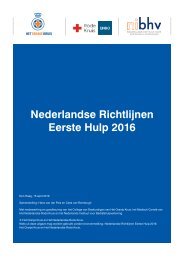Thesis-Anne-Vos-Masters-SBR-and-EU-Law-3
Thesis-Anne-Vos-Masters-SBR-and-EU-Law-3
Thesis-Anne-Vos-Masters-SBR-and-EU-Law-3
You also want an ePaper? Increase the reach of your titles
YUMPU automatically turns print PDFs into web optimized ePapers that Google loves.
alance conflicting policies; the measures must not be discriminatory <strong>and</strong> must not go beyond what<br />
is strictly necessary for the protection of the environment. 301<br />
The legal enforceability of the principle has been subject of debate within the Court's case law.<br />
Several legal consequences are distinguished by Jans & Vedder. First, the principle can be used to<br />
decide on the choice of legal basis of environmental measures. 302 Second, the principle "broadens<br />
the objectives of the other powers laid down in the Treaty <strong>and</strong> thus limits the role of the specific<br />
powers doctrine in environmental policy." 303 Environmental objectives can thus now be taken into<br />
account without interfering with the doctrine of conferred powers. Moreover, the principle can be<br />
used in order to review whether actions of <strong>EU</strong> institutions are legitimate (in view of the<br />
environmental objectives that have to be taken into account). According to Jans & Vedder it is in<br />
principle possible to review <strong>EU</strong> measures in light of the environmental objectives. 304 However, <strong>EU</strong><br />
institutions have wide discretionary powers in balancing different policies <strong>and</strong> objectives. Therefore,<br />
the Court may only annul an act if a manifest error of appraisal with regard to the conditions of<br />
Article 192 TF<strong>EU</strong> is committed. This will probably only occur in exceptional circumstances. 305<br />
Moreover, as Jans & Vedder point out, it is important to distinguish between the objectives (to<br />
which Union policy 'shall contribute'), the principles (for which the Union 'shall aim at a high level of<br />
protection') <strong>and</strong> the policies (which the Union 'shall take into account'). This will influence the level<br />
of judicial review by the Court. 306 Hence, review is limited <strong>and</strong> shall depend on the circumstances<br />
of the case. This is confirmed by Krämer who also states that the wide discretion of Union<br />
institutions will make an action on Article 11 difficult. 307 The fourth legal consequence is the<br />
interpretation of secondary <strong>EU</strong> legislation in light of the environmental objectives, also outside the<br />
environmental field. 308 The final consequence referred to by Jans & Vedder is the influence of the<br />
integration principle on the national (in this thesis: Dutch) level. Since Article 11 TF<strong>EU</strong> expressly<br />
refers to the Union, there is no direct consequence for the MS. Indirectly, the principle will have<br />
consequences, for e.g. <strong>EU</strong> legal acts addressed to the MS. Also, Jans & Vedder also argue that if<br />
the <strong>EU</strong> act leaves some discretion to the MS, they also have to apply the integration principle<br />
themselves. 309 However, in areas that have not been harmonised, MS are not bound by <strong>EU</strong><br />
environmental objectives <strong>and</strong> principles. Although, MS always have to comply with the principle of<br />
sincere cooperation of Art. 4(3) T<strong>EU</strong>. Hence, when implementing <strong>EU</strong> law, MS always have to<br />
comply with the environmental principles.<br />
The CFR, which has the same legal value as the Treaties according to Art. 6(1) T<strong>EU</strong>, also codifies<br />
the integration principle in Article 37. However, this Article is not as strongly expressed as Article<br />
11 TF<strong>EU</strong>. It only refers to policies (not activities) <strong>and</strong> is less broadly formulated. 310<br />
Special attention to the application of the principle to environmental issues is not necessary here,<br />
since the principle only applies to (at least partly) environmental issues.<br />
5.5.2 Dutch level<br />
The integration principle is an <strong>EU</strong> principle <strong>and</strong> has no Dutch equivalence on the national level. It<br />
can indirectly be found in the regulation on the duty to carry out an EIA when preparing projects or<br />
301<br />
Jans & Vedder (2012), pp. 23-24; Case 240/83 ADBHU [1985] ECR 531.<br />
302<br />
Jans & Vedder (2012), p. 24; Case C-62/88 EP v. Council [1990] ECR I-1527.<br />
303<br />
Jans & Vedder (2012), p. 25; Case C-513/99 Concordia Bus Finl<strong>and</strong> [2002] ECR I-7213; Case C-448/01 EVN <strong>and</strong><br />
Wienstrom [2003] ECR I-4527.<br />
304<br />
Jans & Vedder (2012), p. 26; Case C-62/88 EP v. Council [1990] ECR I-1527; Case C-341/95 Gianni Bettati [1998] ECR<br />
I-4355.<br />
305<br />
Jans & Vedder (2012), p. 26.<br />
306<br />
Jans & Vedder (2012), p. 27.<br />
307<br />
Krämer (2011), p. 21.<br />
308<br />
Jans & Vedder (2012), p. 27; see e.g. Joined Cases T-74, 76, 83, 85, 132, 137, 141/00 Artegodan GmbH a.o. v.<br />
Commission [2002] ECR II-4945, paragraph 183, in field of public health.<br />
309<br />
Jans & Vedder (2012), p. 28.<br />
310<br />
Jans & Vedder (2012), p. 29.<br />
66



